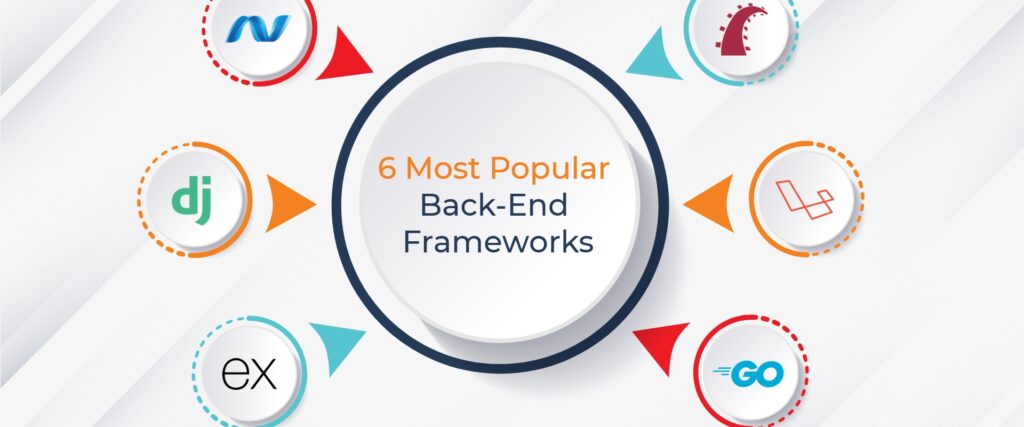Popular back-end frameworks to use in 2022

The data-driven web is more popular than ever and the web developers are developing at a fast pace. Upon the rise of mobile app development, the back-end frameworks became one of the most widely used tools across programming languages and platforms.
Back-end frameworks are just as important than front-end frameworks as the application’s speed & stability depend on the back-end. Selecting the optimal back-end framework guarantees an excellent user experience throughout the web app.
In this article, we have covered the 6 most popular back-end frameworks in 2022 to build a web application. We have also mentioned the best attributes for each framework.
6 most popular back-end frameworks in 2022
The choice of back-end framework depends on a lot of factors. For example, there are specific frameworks available for a particular front-end technology just like Django for Python and ASP.NET for C#.
Some technologies offer a vast scope of integration and some might have limited options available. One factor to be taken into the consideration is the size of the project and end goals.
Considering all those factors, you will be having a clearer idea of which back-end framework is best for your project.
Following are the 7 most popular back-end frameworks to build a web app in 2022.
- ASP.NET
- Django
- Express
- Ruby on Rails
- Laravel
- Golang
Let’s have a detailed look at them and understand when they are best to choose.
-
- ASP.NET
ASP.NET is one of the oldest yet one of the most popular back-end frameworks for windows-based applications. Developed by Microsoft in 2000, it has been constantly upgraded with modern-day features to keep it relevant and useful for modern applications. ASP.NET is for web apps based primarily on C#. The integration of visual studio with ASP.NET has increased its cross-platform compatibility too.
Best use case
- To build a web app with minimal coding as ASP.NET has a huge preconfigured library
- Django
Django is an open-source back-end framework to build web apps using Python. Django is invented by two Python developers and it is based on the DRY (Don’t repeat yourself) ideology which focuses on reusing the code. Many applications we use today like Spotify, Drop Box, and more have their web apps based on the Django framework.
Best use case
- To build large scale web apps as it gives an upper hand by reducing redundant code due to its DRY ideology and it is also one of the most secure frameworks making it a better choice for large scale companies.
- Express
Introduced in 2010 for Node developers, Express.js is a minimal and lightweight form of Node.js. With the invention of Node.js for the JavaScript runtime environment, its popularity has increased. Express.js is used by web developers to build lean online web apps and APIs.
Best use case
- To build lightweight online applications which need very less loading time.
- Ruby on Rails
Ruby on Rails has been proving itself as the most scalable back-end framework to build web apps for over two decades. It keeps supporting your needs as your business keeps growing with very minimal changes in the code. Ruby on Rails is often considered the best choice while building a web app with fast scalability in mind.
Best use case
- To build web apps which are projected to be scaled quickly
- Laravel
Laravel is an open-source backend framework based on PHP. Laravel allows developers to make web applications at any scale using object-oriented programming methods. It is considered to be very friendly for beginners due to its simple interface, extensive libraries, and excellent API support.
Best use case
- To build PHP based web applications of any scale
- Golang
Developed at Google, Golang is the latest back-end framework on the list. Despite being a new technology, it is supported by a large number of platforms like AWS & Heroku. Golang is not being used in a lot of applications we see these days but it is gaining popularity and it is predicted to be amongst the most popular back-end framework soon.
Best use case
- To build large scale applications which can run on low processing powers
That was all for this list but eventually, you should look for what suits your project needs the best as software solutions are very subjective to what is it built for.
If you are an aspiring software engineer and looking to work in a challenging environment with other brilliant technology minds then visit the careers page and apply for the job openings that suit your profile the best.
